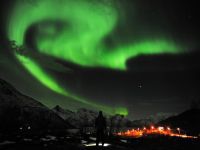
Northern Lights more intense because of strong solar storm

On Sunday, the largest solar flare of the last six years was identified. The solar storm turned the cold sky of the northern end of the earth into a light show because of the intensification of the northern aurora borealis.
Even the most experienced observers were surprised by the intensity of the aurora borealis that swept the night sky in northern Scandinavia, after the largest solar flare in six years.
"It was really incredible," said the British astronomer, John Mason, on the deck of a cruise that operates in Norway. "I saw my first aurora borealis 40 years ago, and this is one of the best," Mason said.
The aurora borealis is caused by solar wind particles that carry electric particles released in solar flares. Upon reaching the Earth's magnetic field,, some particles are retained, causing the light display.
The storm Tuesday seemed to mostly miss Earth, going a bit north, so auroras did not extend too far south Tuesday night.
The solar storm created light shows over England and Canada on Tuesday and have lit up the skies above Scotland, with more expected in days to come. They were also visible Monday night from northeast England and Ireland, where such sightings are a rarity.
The storm was rated a 3 on a scale of 1 (minor) to 5 (extreme). Storms in the next couple of years will most likely be more severe.
Solar activity should increase over the next few years, as solar activity waxes and wanes on a roughly 11-year cycle. The sun has been relatively quiet since 2002, the quietest period in 100 years.
Translated from the Portuguese version and appended by:
Lisa Karpova
Pravda.Ru